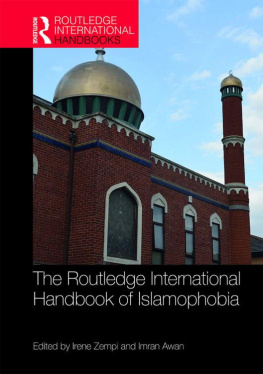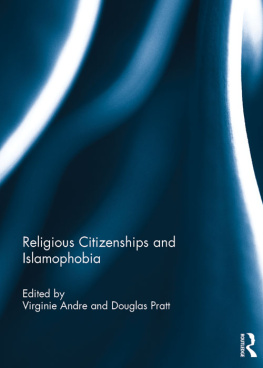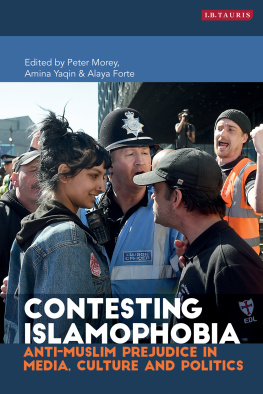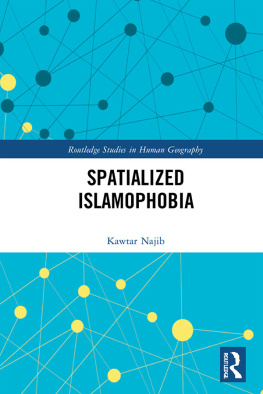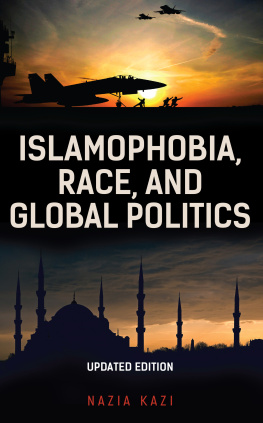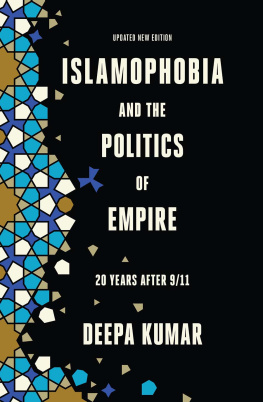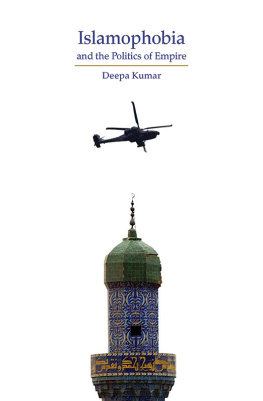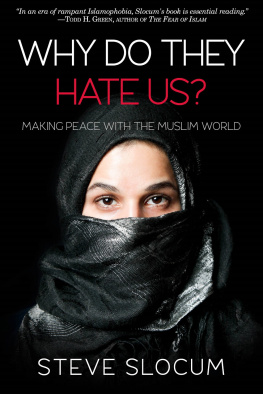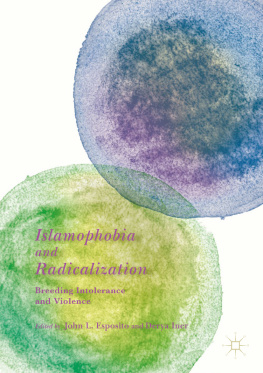Islamophobia
Islamophobia
The Challenge of Pluralism in the
21st Century
Edited by
JOHN L. ESPOSITO AND
IBRAHIM KALIN


Oxford University Press, Inc., publishes works that further
Oxford Universitys objective of excellence
in research, scholarship, and education.
Oxford New York
Auckland Cape Town Dar es Salaam Hong Kong Karachi
Kuala Lumpur Madrid Melbourne Mexico City Nairobi
New Delhi Shanghai Taipei Toronto
With offices in
Argentina Austria Brazil Chile Czech Republic France Greece
Guatemala Hungary Italy Japan Poland Portugal Singapore
South Korea Switzerland Thailand Turkey Ukraine Vietnam
Copyright 2011 by Oxford University Press, Inc.
Published by Oxford University Press, Inc.
198 Madison Avenue, New York, New York 10016
www.oup.com
Oxford is a registered trademark of Oxford University Press.
All rights reserved. No part of this publication may be reproduced,
stored in a retrieval system, or transmitted, in any form or by any means,
electronic, mechanical, photocopying, recording, or otherwise,
without the prior permission of Oxford University Press.
Library of Congress Cataloging-in-Publication Data
Islamophobia: the challenge of pluralism in the 21st century / edited
by John L. Esposito and Ibrahim Kalin.
p. cm.
Includes bibliographical references and index.
ISBN 9780-19-975364-2; 9780-19-975365-9 (pbk.)
1. IslamPublic opinion. 2. MuslimsPublic opinion. 3. Islam and politics.
4. MuslimsNon-Muslim countries. 5. Islam21st century.
1. Esposito, John L. II. Kalin, Ibrahim.
BP52.I854 2011
297.09049dc22 2010013086
9 8 7 6 5 4 3 2 1
Printed in the United States of America
on acid-free paper
Foreword
Islamophobia and the Challenges of Pluralism in the 21st Century is a timely topic in a world in which the relationship between Islam and the West matters more than ever before. The increasing interdependence and coexistence among dissimilar peoples makes mutual acceptance and respect requisites for social harmony in our interconnected world; thus, the need for the Muslim and the Western worlds to accommodate each other is especially important given the central role these two large communities have been playing in global relations for the last fourteen centuries.
Religion is an indispensable component of human life. From time immemorial, religion has shaped the cultural identity of individuals and communities as well as the building of civilizations. In addition to the importance religion carries for all peoples of the world, Islam has been a central factor in the lives of its adherents. Its system of faith has guided them not only in spiritual and moral matters but also in their total world outlook. Islam has a distinctive place in Muslim life; as a sociological reality it influences and guides attitudes and behavior. It is therefore natural that Muslims cannot dismiss attacks directed against their religion as mere opinions but feel deeply offended and sometimes react strongly.
The weight of Islam in social life differs from one country to another. State systems and intellectuals attitudes vary significantly, ranging from the Islamic to the secular-oriented, creating a diversity of opinions about the place of Islam in the public sphere, as to where the line between religion and politics should be drawn. Such diversity certainly depends in part on the existence and sustainability of democracy in Muslim countries. Democracy, engaging civil society and public opinion, together with socioeconomic development, can lead to the modernization of societies and help them fight marginalization and radicalization.
Notwithstanding the diverse orientations of governments, the teachings of Islam generally constitute the basic code of ethics that guides Muslims in their daily lives, as witnessed throughout the history of Islamic civilization. These teachings include moral excellence, honor, virtue, justice, piety, equity, compassion, and human dignity. Christianity and Islam share a common monotheistic vision, as well as these basic teachings. However, despite this closeness and the fact that our histories are tightly linkedoffering compelling reasons to live together and cooperatemuch of the history of the Muslim world and the West has too often been marked by mutual hostility, giving rise to an enduring tradition of distrust and animosity.
We have always looked at our past and our present from different and, more often, contradictory angles, trying to disavow or ignore each other. I do not think that theology and religion have been a major factor in this antagonism. To find the root causes one has to look elsewhere. Islam, since its inception, has recognized Judaism and Christianity, biblical prophets, and the Torah and the Gospels as revealed religions and their adherents as the people of the Book. Islam sees both Judaism and Christianity not as others to tolerate but as standing de jure, as revealed religions from God. Moreover, their legitimate status is not sociopolitical, cultural, or civilizational but religious. Islam does not see itself as coming to the religious scene ex nihilo but as reaffirming the same truth presented by all of the prophets of Judaism and Christianity.
Muslims have always been committed to pluralism and tolerance. Historically, Muslims played a pioneering role in acquiring knowledge and disseminating expertise in various fields and sharing it with other civilizations. Under the centuries-long rule of Islam, non-Muslims could practice their faiths: Their religious institutions and places of worship were repaired and maintained with public funding, and their respective personal laws remained in effect. Islam adopts religious and cultural pluralism as a guiding principle in social administration. As Karen Armstrong points out, in the Islamic empire, Jews, Christians and Zoroastrians enjoyed religious freedom. This reflected the teaching of the Koran, which is a pluralistic scripture, affirmative of other traditions. Muslims are commanded by God to respect the people of the book, and reminded that they share the same belief and the same God.Istanbul, and many cities and towns throughout the Ottoman Empire, and communities flourished throughout the Muslim world.
Today, Islam is increasingly regarded by some in the West as a source of intolerance, extremism, and terrorism, one whose adherents are out to destroy Western values. By contrast, the Muslim world is increasingly regarding the West as an arrogant, imperialistic colonizer prone to propagate Western materialism and mass culture, to destabilize and destroy Islam, and to exploit the Muslim worlds potential while imposing Western values and way of life on the rest of the world. In recent years, some newspapers in Europe, under the guise of opening debate on taboo issues, have proclaimed that the West has been silenced by Islam and found it fit to publish the infamous Danish cartoons of the Prophet Mohamed. However, their attempts have proved to obscure rather than enlighten and have also needlessly offended and thus been condemned by many Muslims. Such an approach adds fuel to the fire and merely reinforces prejudices on both sides.
This controversy was also an occasion for some in the Western media to invoke the fundamental right of freedom of expression. Nobody can contest this right, which is at the heart of every enlightened society. However, while we consider this a clear indication of growing Islamophobia and discrimination toward Islam and Muslims, we also see behind this imposed polarity between freedom of expression and respect for religious beliefs an attempt to test the peoples will and a lack of understanding of their sensitivities to the sacred constants of their faith. I firmly believe that one should recognize the inalienable right to freedom of expression; however, this right should be exercised responsibly and judiciously.
Next page

